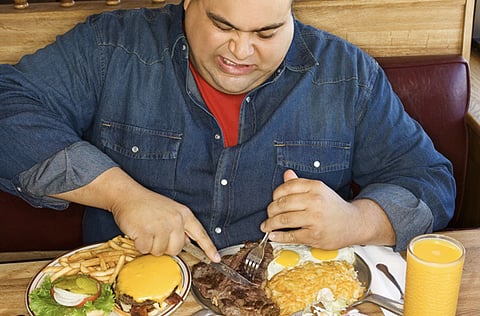Don’t binge during Eid
Dieticians and physicians advise people to ease slowly into normal routine

Dubai: Eid is a time for celebration and festivities that often gets translated into overindulgence after a month of fasting. After being without food and water for more than 12 hours, our bodies need to make major adjustments to be able to handle the food and water overload and we need to ease gently into it, warn nutritionists and physicians.
Dr M. Hamed Farooqi, Director of the Dubai Diabetes Centre of the Dubai Health Authority (DHA), explains what really happens to our bodies when we simply let go of our control over food during Eid. “Overloading a body that is used to the Ramadan timetable can create health problems and is not advisable. Since the body has tuned itself to the timetable of Ramadan, suddenly overloading with food, especially sweets, is going to cause a major problem. Since sweets and sugar containing foods and drinks are central to the Eid celebration, a significant elevation in blood sugar levels is seen quite often. A healthy body may handle that with some effort but if there is some ailment in the background, it can result in serious health complications.”
He added that the DHA hospitals get plenty of cases of nausea, vomiting and indigestion.
Nadine Aoun, Clinical Dietician at Medcare, seconds that. “Our bodies cannot tolerate huge amounts of food which are usually loaded with fat and sugar. This causes intestinal gas, indigestion, bloating, acid reflux and even constipation. You can be a victim of either or all of these if you abuse your body during Eid. What happens is that the body, unable to digest so much food, has to work harder and gets under great stress,” she explains.
To ease back into regular eating it is important to have a control over portion size and also the kind of food groups you need to include for balance nutrition. Aoun advises sticking to a very healthy breakfast on the first day of Eid. “Do not go overboard as breakfast is your first meal. Do not eat sweets or fast food for breakfast. Start with skimmed meal and a healthy cereal or opt for a wholewheat bread sandwich that has low fat cheese and grilled vegetables with a light tea or coffee. It is important to eat small portions as too much food will put great strain on your gall bladder.”
Dr Farooqi especially cautions people with diabetes. “In case of people with diabetes, medical emergencies due to very high blood sugar levels are frequent in the days following Eid. This is especially common with people who have diabetes, since they have put their pancreas into overdrive. The risk is higher with people who suffer from type 1 diabetes.”
He advised people to control both the quantity as well as timing of the food. “Eid festivities last for three days. So it is advisable for people to eat small portions and more frequently during the day as you are more likely to burn those calories. Keep a close eye on the sugar content of the items you choose to eat particularly if you are a diabetic. In case of people with high blood pressure, do avoid too much salt intake. Fried foods as well as other dietary items containing fats should be kept to a minimum.”
Sign up for the Daily Briefing
Get the latest news and updates straight to your inbox



